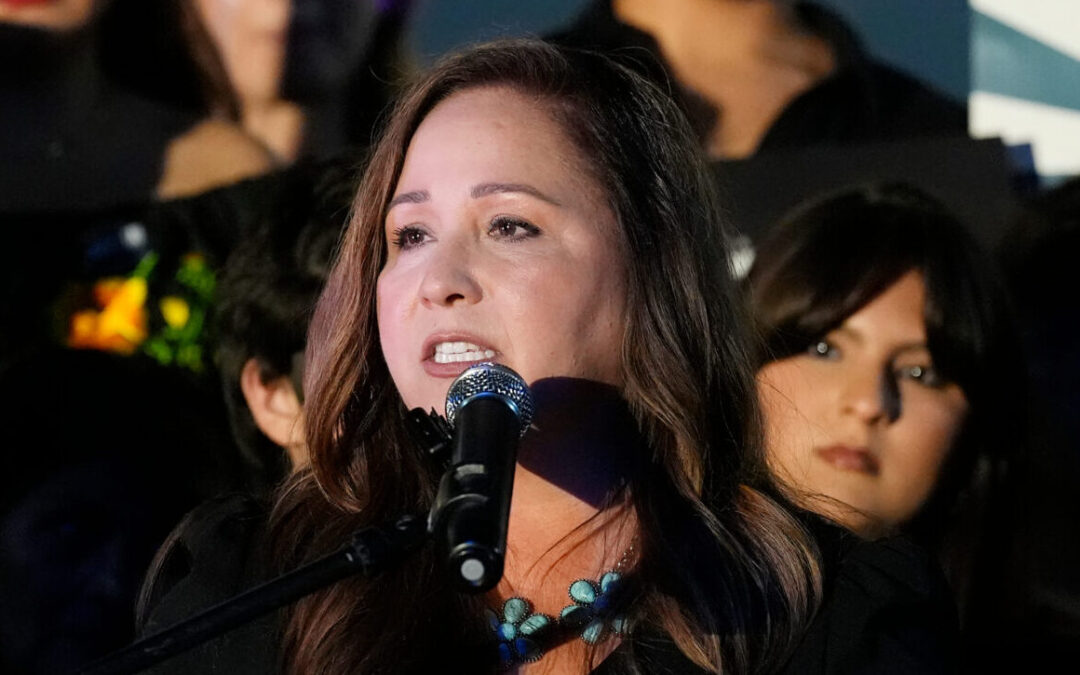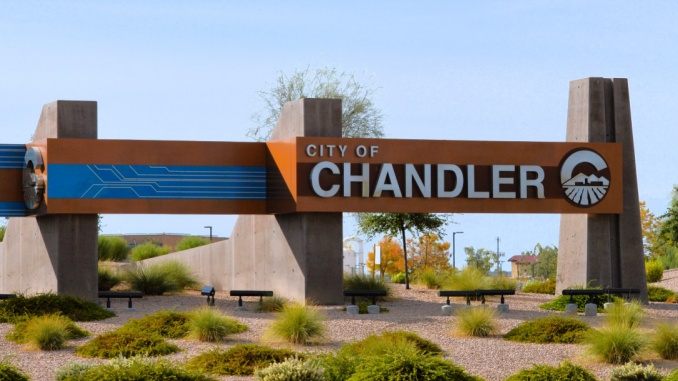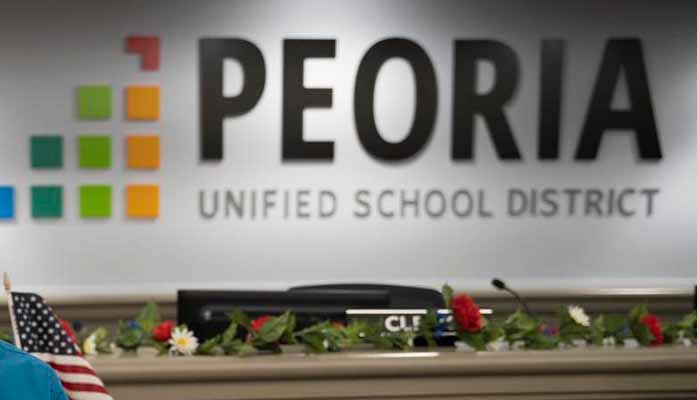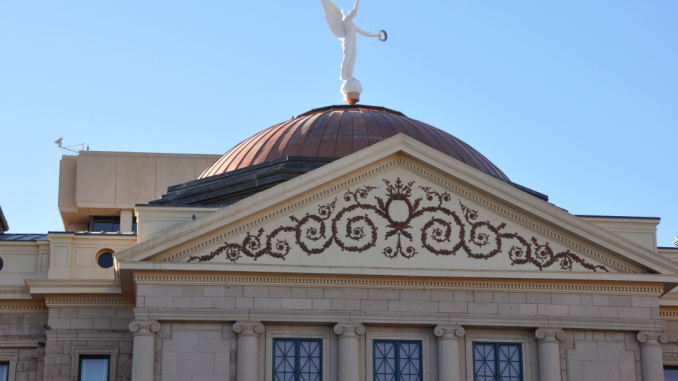
by Staff Reporter | Oct 11, 2025 | News
By Staff Reporter |
Representative-elect Adelita Grijalva says her district deserves representation, though she was silent on the absence of her father, the late Raúl Grijalva, from office.
The younger Grijalva has yet to be sworn in. She says Republicans are to blame for their refusal to agree to Democrats’ desired Obamacare continuations to lift the ongoing government shutdown.
“Speaker Johnson continues to make excuses but all the while southern Arizona still does not have a voice in Washington,” said Grijlava.
Senator Ruben Gallego also blamed House Speaker Mike Johnson and the rest of his Republican colleagues for Grijalva not being sworn in, claiming Johnson was telling “lies” to the public.
Contrary to Grijalva’s characterization of the situation, Grijalva can’t be sworn in because the statewide certification has yet to take place.
Grijalva’s desire to secure representation for her district is also a newfound one. She had little to say during the final years of her father’s term.
The late Grijalva missed most votes from last year and this year amid a lung cancer battle that would ultimately claim his life in March at 77 years old. The longtime Democrat had held his seat for 20 years when he announced his lung cancer diagnosis in 2023.
The late Grijalva missed nearly all votes (about 97 percent of votes) this and the last session before his passing. The only vote he took this session was for Democratic Rep. Hakeem Jeffries for House Speaker at the start of session. He defended his absence with the claim his vote wouldn’t have any impact in a Republican-controlled Congress.
“They’re inconsequential because the Republicans are in charge and it’s the worst performing Congress in decades, if not a hundred years,” said Grijalva at the time.
Tucson residents were quick to point out the successor Grijalva’s hypocrisy.
“A lung cancer diagnosis in April 2024 led Grijalva to miss most of his votes in the House of Representatives throughout the year and into 2025,” said one user. “[You] didn’t say a damn word.”
Grijalva couldn’t be sworn in sooner than next Tuesday, anyways, because that’s when the statewide canvass is scheduled.
Arizona Secretary of State and fellow Democrat Adrian Fontes issued a press release on that point. The deadline to file an election contest, also, will not occur until October 20.
Next Tuesday is also the earliest date the Senate will reconvene to possibly agree on a continuing resolution to cease the government shutdown.
Debbie Lesko, Maricopa County Supervisor and former congresswoman, reminded the public that she wasn’t sworn in until the House began its session that year, in 2018.
“[This is] what’s happening with Grijalva,” said Lesko. “The Democrats and media are making a big deal over nothing.”
Congress had its longest shutdown on record from December 2018 to January 2019. The shutdown has lasted for over a week now.
AZ Free News is your #1 source for Arizona news and politics. You can send us news tips using this link.

by Jonathan Eberle | Oct 11, 2025 | Economy, News
By Jonathan Eberle |
Arizona State Senator David Farnsworth, chairman of the Senate Appropriations and Transportation Committee, is doubling down on his commitment to improving Arizona’s transportation network, emphasizing both immediate roadway repairs and longer-term investments in next-generation infrastructure.
Farnsworth noted that Arizona’s rapid population growth is putting added strain on highways and local roads, making safety and upkeep a pressing priority. His plan, he said, reflects a blend of conservative fiscal principles and forward-looking technology, designed to strengthen connectivity across the state while preparing for future mobility needs.
A central component of that vision is Advanced Air Mobility (AAM) — a developing technology that uses electric aircraft, sometimes called “air taxis,” capable of vertical takeoff and landing for short-distance travel. Advocates say AAM could ease traffic congestion, expand emergency response capabilities, and connect rural communities more effectively. Farnsworth has supported legislative work on AAM since 2024, with an eye toward balancing innovation with public safety and regulatory clarity.
Other states are already moving toward implementation. For example, Archer Aviation is slated to provide official air taxi services for the 2028 Olympic Games in Los Angeles. Farnsworth said Arizona must be proactive in keeping pace with such developments.
The senator also pointed to autonomous vehicle testing in Arizona, particularly self-driving ground taxis, as a model for how advanced technology can be integrated into daily life. Together with AAM, he said, these tools represent the next chapter of transportation policy.
“The work begins by repairing what is broken, followed by building what comes next,” Farnsworth said. “Advanced Air Mobility and autonomous vehicles are no longer concepts of the future—they are active technologies with real-world applications. My job is to ensure Arizona stays ahead of the curve, not behind it.”
Farnsworth stressed that his focus remains on practical investments and collaboration with communities, technology leaders, and policymakers. His goal, he said, is a transportation system that is modernized, fiscally responsible, and designed to serve Arizona residents well into the future.
Jonathan Eberle is a reporter for AZ Free News. You can send him news tips using this link.

by Charlotte Golla | Oct 10, 2025 | Opinion
By Charlotte Golla |
Chandler, Arizona, has a special election coming up on November 4, 2025. If you’re a resident, keep an eye on your mailbox. Ballots were mailed to voters on Wednesday, October 8, 2025.
One matter on this year’s special election ballot seems rather innocuous—Proposition 410—Charter Amendment Clarification of Term Limits for Councilmembers and Mayor.
At first glance, this appears to be a simple clarification of murky language in an outdated city charter. The current city charter states: “No person shall be eligible to be elected to the office of councilmember for more than two consecutive terms, or to the office of mayor for more than two consecutive terms or to more than a consecutive combination of the same.”
Simply put, candidates can hold office for two consecutive terms and then must sit out four years before running again. This language, however, poses a major problem. The past three Chandler mayors all served 8 years (two terms) on city council and then served 8 years (two terms) as mayor. This is in violation of the charter as it is currently written.
This all came to light in May of this year. Matt Orlando, a current 2-term Chandler city councilmember who filed a statement of interest to run for mayor in 2026, was quoted as saying, “It’s all how we interpret the charter – Bottom line is this: there is some clarity that is needed to fix the charter language.”
There was some debate at the subsequent city council meetings about whether this should be fast tracked to the November 4th special election ballot or tabled for community discussion and then voted on in 2026. The council ultimately voted 6-1 in favor of clarifying the charter language to, in essence, EXTEND the term limits from 8 years in office at city level to 16 years in office at city level. As currently written, an individual could not run for mayor after two terms on city council without a legitimate legal challenge.
This all sounds pretty boring, right? I certainly thought so. The last three Chandler mayors all served 16 years—8 on council and 8 as mayor. And Chandler is one of the best run, most financially solvent cities in Arizona. So, who cares?
Then I started seeing the signs—VOTE YES ON PROP 410 – KEEP CHANDLER TERM LIMITS (emphasis added).
Wait…am I confused? Isn’t a yes vote intended to get rid of the current term limits and extend them to 16 consecutive years at city level—8 on council and 8 as mayor?
After seeing the signs, I went home and did some research. And I was right. A yes vote most certainly does NOT keep term limits as written. It extends them. So, then I made some phone calls, specifically asking if it is legal to lie on campaign signs. And guess what? IT IS LEGAL TO LIE ON CAMPAIGN SIGNS. Whoa. I just went from a whole level of not caring to being very perturbed.
Why the lies? What is going on? And who is behind the YES ON PROP 410 campaign? If we are being outright lied to on campaign signs up all over the city, these are questions we should be asking. And I am asking them.
I’m not sure who is behind it, but I do know that Councilmember Matt Orlando, who plans to run for mayor in 2026, has made it clear that he fully endorses the Yes on 410 messaging. And interestingly enough, he would be the one who would benefit the most from its passage.
Do we really want a city leader who knowingly misleads his constituents for personal gain?
I know I don’t.
Charlotte Golla is Chandler resident of 20 years, wife and mother of four children, fundraising consultant, and concerned citizen.

by Staff Reporter | Oct 10, 2025 | Education, News
By Staff Reporter |
A school social worker “gone rogue,” who resigned to avoid firing in 2023, claimed she had the approval of a governing board member.
Peoria Unified School District (PUSD) investigated and ultimately released a now-former Peoria Flex Academy social worker, Allyson Jamee Ross, for treating students and taking them off campus without parental consent, according to records obtained and first reported on by the Arizona Daily Independent.
Ross worked in PUSD from around 2019 to 2023. Prior to that, Ross worked with the Child Protective Services and foster care systems in both Arizona and Virginia.
Ross defended her actions — which included taking students to doctors appointments and serving as their health advocates, helping a student plan to run away from home, taking a pregnant student to a Wiccan for consultation, and assisting a student with securing a birth control prescription — as necessary, comparing parents to “wolves” when describing their involvement.
“Our students don’t have the parents or guidance to teach them those skills,” said Ross. “I will be in the wrong, but I will never send a student away because I don’t have a consent form.”
Ross claimed she acted with the approval of her boss, Peoria Flex Academy Principal Cybill Jacob, and PUSD governing board member Melissa Ewing.
“She [Jacobs] knows exactly what I’m doing with students every single week. She knows very well, and even brags to Melissa [Board Member] about how her social worker goes so above and beyond and does all these great things like taking them to doctor’s appointments, food stamps, social security, etc.,” said Ross in an interview with investigators. “It was completely supported by everyone, driving students in personal vehicles. The van is never available, always broken, stolen catalytic converter, or always in the shop.”
Ross also violated district policy by transporting them regularly in a personal vehicle. School leaders attempted to resolve Ross’ infractions through trainings and meetings before turning her over for an investigation that concluded with giving her the option to voluntarily resign or face punishment.
PUSD didn’t file a statement of charges against Ross since she voluntarily resigned and voluntarily surrendered her social worker certificate.
PUSD also reported Ross to the Arizona State Board of Education.
PUSD Board President Heather Rooks shared the report on Ross. Ewing admonished Rooks for sharing the article and the detail of her alleged knowledge of the incident publicly.
“I had no knowledge of this happening and never would have supported this. You could have placed a phone call to me to ask me that as we sit on the same board. We have sat together for almost 3 years. We have both heard the same information both in public and in executive session,” said Ewing. “As President of the Board, you could have asked that this be reviewed in executive session – oh wait you did, despite it happening 2 years ago. All 5 board members heard the same information.”
State Senate candidate Anthony Kern (also a former state lawmaker) said that this incident justified the opposition he and other Republican lawmakers share over having social workers on school campuses.
“[Social workers] are tools of the deranged Democrats,” said Kern. “Get your children out of public schools. Sign up for an ESA account.”
AZ Free News is your #1 source for Arizona news and politics. You can send us news tips using this link.

by Jonathan Eberle | Oct 10, 2025 | News
By Jonathan Eberle |
Arizona House Republican leaders are demanding answers after learning that the Chief Medical Officer of the state’s Medicaid program, AHCCCS, has been serving with an expired medical license.
According to records from the Arizona Medical Board, Dr. Theresa Costales, a psychiatrist appointed as Chief Medical Officer in January 2025, failed to renew her license, which was due April 9. The statutory grace period ended on August 9, leaving the license fully expired. Despite this, Dr. Costales continues to advise on state health policies that impact more than 2 million Arizonans.
House Speaker Steve Montenegro called the lapse “a failure of oversight” by Governor Katie Hobbs’ administration. “A lapse like this should never happen in a healthcare agency responsible for millions of people,” he said. “The public deserves accountability when even the most basic standards aren’t met.”
House Majority Leader Michael Carbone echoed the concern, noting that license verification is a simple process. “Any citizen can look this up in minutes. That it slipped through the cracks at the highest level of medical leadership is completely unacceptable.”
House Majority Whip Julie Willoughby, who is also a healthcare professional, questioned whether key policy decisions were made without proper credentials in place. “You cannot have a Chief Medical Officer without an active license—it’s that simple,” she said. She raised particular concern about the recent rollout of the controversial Home and Community-Based Services (HCBS) assessment tool, asking whether decisions tied to the program were made under expired authority.
Republican leaders also pointed to other state agencies, such as the Department of Corrections, that explicitly require valid medical licenses for their top medical positions. They argue AHCCCS should be held to the same standard, given its role in overseeing care for vulnerable populations.
Speaker Pro Tempore Neal Carter said the situation undermines public confidence. “Governor Hobbs’ administration has failed once again to ensure competence and accountability in state government. This isn’t a small oversight—it undermines trust in one of Arizona’s largest healthcare agencies.”
Jonathan Eberle is a reporter for AZ Free News. You can send him news tips using this link.





